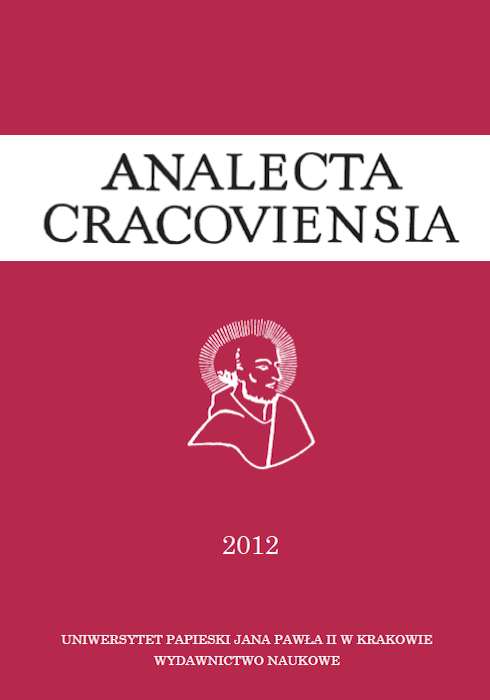Wymiary postawy posłuszeństwa w wybranych kazaniach Fabiana Birkowskiego OP (1566–1636)
DOI:
https://doi.org/10.15633/acr.5Słowa kluczowe:
The elders, following Christ, God’s will, harmony of the universe, humility, infused contemplation, involvement of will and reason in obedience, mystical purification, obedience, objective happiness, passivity, serviceAbstrakt
Birkowski’s sermons show a deep vision of obedience which constitutes a program of spiritual life with its particular dimensions. Obedience as a man’s response to God’s plan is a way of getting all goods prepared by God and God alone, i.e. an ultimate accomplishment of a human heart. This posture means a crucial point of restoration of harmony of creatures made in relation to Jesus through Him the universe is subordinated to the Father. Christ’s submission embraces fulfilment of the Father’s will which expresses itself in service to people and in undergoing an evil in order to redeem the world. Inside this perspective every follower of Christ has to involve his whole spiritual life in obedience so that the corporal offering is supplemented by an act of free will and reason to turn from subjectivism towards real happiness. A very specific dimension of obedience concerns mystical life in which human ordinary way of cooperation with grace is to be replaced by mystical passivity. Thanks to it man is being nourished with new food of contemplation in a rhythm of progressive gratification.
The Birkowski’s apprehension reflects good points of early modern Catholic theology that is an optimistic vision of man and his liaison with grace. This program enables him to shape his spiritual experience in every respect by supplying rules of life and divine power. The complete system formulated by Birkowski can be regarded as an outstanding achievement against the background of Polish early modern spirituality along with Akademia pobożności (Krakow 1628) by the other Dominican Mikołaj Mościcki. Their mystical threads are also an interesting issue at the beginning of the XVII c., which turned out a flourishing period called later A Golden Age of Polish Spirituality.
Pobrania
Opublikowane
Numer
Dział
Licencja
Prawa autorskie (c) 2012 Marcin Godawa

Praca jest udostępniana na licencji Creative Commons Attribution-NonCommercial-NoDerivatives 3.0 Unported License.
Obecnie autorzy publikujący w czasopiśmie udzielają jego wydawcy zgody o następującej treści:
- Autor zachowuje autorskie prawa majątkowe do utworu, a jednocześnie udziela wydawcy czasopisma zgody na jego pierwszą publikację w wersji drukowanej i wersji online na licencji Creative Commons Uznanie autorstwa 4.0 Międzynarodowe oraz zgody na wykonywanie opracowań, w tym przekładów.
- Autor ma możliwość udzielania zgody niewyłącznej na opublikowanie utworu w wersji, która ukazała się w czasopiśmie (np. zamieszczenia go w repozytorium instytucjonalnym lub opublikowania w książce), wraz z informacją o jego pierwszej publikacji w czasopiśmie.
- Autor może umieścić swój utwór online (np. w repozytorium instytucjonalnym lub na swojej stronie internetowej) jeszcze przed zgłoszeniem utworu do czasopisma.

